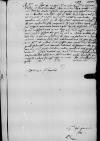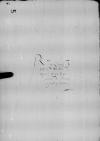Heri is cf. Georg HEGEL to Ioannes DANTISCUS Cracow, 1539-07-06, CIDTC IDL 2174⌊Mauritius (Moritz), at least in 1537-1547 servant of Ioannes Dantiscus, often sent with letters and packages to the royal court (CIDTC, e.g. IDL 1630, IDL 4476, IDL 3266, IDL 3279)⌊nuntiusMauritius (Moritz), at least in 1537-1547 servant of Ioannes Dantiscus, often sent with letters and packages to the royal court (CIDTC, e.g. IDL 1630, IDL 4476, IDL 3266, IDL 3279)⌋ meuscf. Georg HEGEL to Ioannes DANTISCUS Cracow, 1539-07-06, CIDTC IDL 2174⌋ rediit et cf. Sigismund I Jagiellon to Ioannes DANTISCUS Cracow, 1539-07-05, CIDTC IDL 5697;
Samuel MACIEJOWSKI to Ioannes DANTISCUS Cracow, 1539-07-06, CIDTC IDL 2177;
Georg HEGEL to Ioannes DANTISCUS Cracow, 1539-07-06, CIDTC IDL 2174;
Stanisław KOSTKA to Ioannes DANTISCUS Cracow, 1539-07-06, CIDTC IDL 2178;
Iustus Lodvicus DECIUS (DECJUSZ, DIETZ) to Ioannes DANTISCUS Cracow, 1539-07-06, CIDTC IDL 2176;
Stanisław HOZJUSZ (HOSIUS) to Ioannes DANTISCUS Cracow, 1539-07-07, CIDTC IDL 2179;
Johann HANNAU Jr to Ioannes DANTISCUS [Cracow], 1539-07-07, CIDTC IDL 2182;
Thomas of Cracow to Ioannes DANTISCUS Cracow, 1539-07-07, CIDTC IDL 2183;
Stanisław AICHLER to Ioannes DANTISCUS Cracow, 1539-07-07, CIDTC IDL 2184;
Stanisław HOZJUSZ (HOSIUS) to Ioannes DANTISCUS Cracow, [1539-07-07], CIDTC IDL 2185⌊adiunctascf. Sigismund I Jagiellon to Ioannes DANTISCUS Cracow, 1539-07-05, CIDTC IDL 5697;
Samuel MACIEJOWSKI to Ioannes DANTISCUS Cracow, 1539-07-06, CIDTC IDL 2177;
Georg HEGEL to Ioannes DANTISCUS Cracow, 1539-07-06, CIDTC IDL 2174;
Stanisław KOSTKA to Ioannes DANTISCUS Cracow, 1539-07-06, CIDTC IDL 2178;
Iustus Lodvicus DECIUS (DECJUSZ, DIETZ) to Ioannes DANTISCUS Cracow, 1539-07-06, CIDTC IDL 2176;
Stanisław HOZJUSZ (HOSIUS) to Ioannes DANTISCUS Cracow, 1539-07-07, CIDTC IDL 2179;
Johann HANNAU Jr to Ioannes DANTISCUS [Cracow], 1539-07-07, CIDTC IDL 2182;
Thomas of Cracow to Ioannes DANTISCUS Cracow, 1539-07-07, CIDTC IDL 2183;
Stanisław AICHLER to Ioannes DANTISCUS Cracow, 1539-07-07, CIDTC IDL 2184;
Stanisław HOZJUSZ (HOSIUS) to Ioannes DANTISCUS Cracow, [1539-07-07], CIDTC IDL 2185⌋[1] ex aula retulit, ex quibus, quae aguntur et in novis habentur, intelliget. Est et cf. Philipp Melanchthon, Epistola Philippi Melanthonis ad Senatum Venetum. Oratio publice habita Wittenbergae in promotione Doctoris Iuris. De scripto Iure et Dignitate Veterum Interpretum Iuris, Nürnberg, 1539 ⌊„Epistula Philipp Melanchthon (Philipp Schwartzerd) (*1497 – †1560), Lutheran theologian, humanist, Martin Luther's collaborator and friend, author of the Augsburg Confession. He was strongly influenced by Luther, whom he called his spiritual father. In 1519 he was present as a spectator at the disputation of Leipzig between Martin Luther and Johann Eck. He was also in attendance at the Diet of Augsburg (1530) and at the religious colloquy of Worms (1557)⌊MelancthonisPhilipp Melanchthon (Philipp Schwartzerd) (*1497 – †1560), Lutheran theologian, humanist, Martin Luther's collaborator and friend, author of the Augsburg Confession. He was strongly influenced by Luther, whom he called his spiritual father. In 1519 he was present as a spectator at the disputation of Leipzig between Martin Luther and Johann Eck. He was also in attendance at the Diet of Augsburg (1530) and at the religious colloquy of Worms (1557)⌋ ad Senate of the Republic of Venice ⌊senatum VenetumSenate of the Republic of Venice ⌋”cf. Philipp Melanchthon, Epistola Philippi Melanthonis ad Senatum Venetum. Oratio publice habita Wittenbergae in promotione Doctoris Iuris. De scripto Iure et Dignitate Veterum Interpretum Iuris, Nürnberg, 1539 ⌋, et nescio quae alia nondum a me lecta.
Quod tardius ad Sigismund I Jagiellon (Zygmunt I) (*1467 – †1548), King of Poland and Grand Duke of Lithuania (1506-1548); Duke of Głogów (Glogau) (1499-1506), Duke of Opava (1501-1506), Governor of Silesia (1504-1506); son of King Kazimierz IV Jagiellon and Elisabeth of Austria⌊maiestatem regiamSigismund I Jagiellon (Zygmunt I) (*1467 – †1548), King of Poland and Grand Duke of Lithuania (1506-1548); Duke of Głogów (Glogau) (1499-1506), Duke of Opava (1501-1506), Governor of Silesia (1504-1506); son of King Kazimierz IV Jagiellon and Elisabeth of Austria⌋ de dignitatum distributione relatum est, illi, qui ambiebant, sibi imputent. Non sum debitor meis impensis cuipiam procurare honores, cum ipsi sibi defuerint. Non est, quod mihi impingant serius a me esse ad aulam missum, nimirum cum miserim postero die, quo mihi communes a Council of Royal Prussia the most important local authority in Royal Prussia. It consisted of two bishops (of Ermland (Warmia), who served as the Council’s president, and of Kulm (Chełmno)), three voivodes (of Kulm, Marienburg (Malbork), and Pomerania), three castellans (of Kulm, Elbing (Elbląg), and Gdańsk (Danzig)), three chamberlains (of Kulm, Marienburg, and Pomerania), and representatives of the three Great Prussian Cities – Gdańsk, Thorn (Toruń), and Elbing (ACHREMCZYK 2016, p. 17-18)⌊dominisCouncil of Royal Prussia the most important local authority in Royal Prussia. It consisted of two bishops (of Ermland (Warmia), who served as the Council’s president, and of Kulm (Chełmno)), three voivodes (of Kulm, Marienburg (Malbork), and Pomerania), three castellans (of Kulm, Elbing (Elbląg), and Gdańsk (Danzig)), three chamberlains (of Kulm, Marienburg, and Pomerania), and representatives of the three Great Prussian Cities – Gdańsk, Thorn (Toruń), and Elbing (ACHREMCZYK 2016, p. 17-18)⌋ redditae fuerant cf. other letter Councillors of Royal Prussia Sigismund I Jagiellon Löbau (Lubawa) 1539-06-14, CIDTC IDT 671⌊litteraecf. other letter Councillors of Royal Prussia Sigismund I Jagiellon Löbau (Lubawa) 1539-06-14, CIDTC IDT 671⌋.
Si quem eo allegare de suis, ut statuit, Dominatio Vestra Reverendissima voluerit, mature fieri potest. Acceleratione res non eget, priusquam Dominatio Vestra Reverendissima de rebus suis nuper per Baltazar of Lublin (†after 1543-05-20), from 1535 at the latest Canon of Kulm (Chełmno); 1538 Judicial Vicar in the Kulm Chapter; Chancellor to the Bishops of Kulm, Ioannes Dantiscus and then Tiedemmann Giese (MAŃKOWSKI 1928, p. 115)⌊cancellariumBaltazar of Lublin (†after 1543-05-20), from 1535 at the latest Canon of Kulm (Chełmno); 1538 Judicial Vicar in the Kulm Chapter; Chancellor to the Bishops of Kulm, Ioannes Dantiscus and then Tiedemmann Giese (MAŃKOWSKI 1928, p. 115)⌋ mihi communicatis, quid petendum aut agendum, commode dispexerit.[2] Ea, quae per me vel scribi, vel fieri volet, oportune atque propense aderunt. cf. other letter [Sigismund I Jagiellon] Council of Royal Prussia Cracow 1539-07-06, CIDTC IDT 697⌊Litterascf. other letter [Sigismund I Jagiellon] Council of Royal Prussia Cracow 1539-07-06, CIDTC IDT 697⌋ regias ad Council of Royal Prussia the most important local authority in Royal Prussia. It consisted of two bishops (of Ermland (Warmia), who served as the Council’s president, and of Kulm (Chełmno)), three voivodes (of Kulm, Marienburg (Malbork), and Pomerania), three castellans (of Kulm, Elbing (Elbląg), and Gdańsk (Danzig)), three chamberlains (of Kulm, Marienburg, and Pomerania), and representatives of the three Great Prussian Cities – Gdańsk, Thorn (Toruń), and Elbing (ACHREMCZYK 2016, p. 17-18)⌊dominos consiliariosCouncil of Royal Prussia the most important local authority in Royal Prussia. It consisted of two bishops (of Ermland (Warmia), who served as the Council’s president, and of Kulm (Chełmno)), three voivodes (of Kulm, Marienburg (Malbork), and Pomerania), three castellans (of Kulm, Elbing (Elbląg), and Gdańsk (Danzig)), three chamberlains (of Kulm, Marienburg, and Pomerania), and representatives of the three Great Prussian Cities – Gdańsk, Thorn (Toruń), and Elbing (ACHREMCZYK 2016, p. 17-18)⌋ palatino alicui transmittendas aliis Dominatio Vestra Reverendissima mittet.
Quam diutissime felicissimeque valere summopere cupio et aveo.


 BCz, 245, p. 210
BCz, 245, p. 210